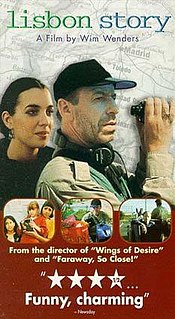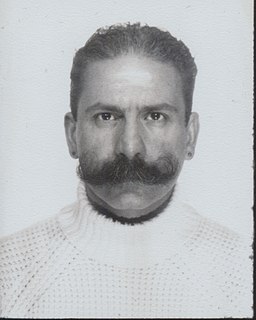Related Research Articles

Abbas Kiarostami was an Iranian film director, screenwriter, poet, photographer, and film producer. An active filmmaker from 1970, Kiarostami had been involved in the production of over forty films, including shorts and documentaries. Kiarostami attained critical acclaim for directing the Koker trilogy (1987–1994), Close-Up (1990), The Wind Will Carry Us (1999), and Taste of Cherry (1997), which was awarded the Palme d'Or at the Cannes Film Festival that year. In later works, Certified Copy (2010) and Like Someone in Love (2012), he filmed for the first time outside Iran: in Italy and Japan, respectively. His films Where Is the Friend's Home? (1987), Close-Up, and The Wind Will Carry Us were ranked among the 100 best foreign films in a 2018 critics' poll by BBC Culture. Close-Up was also ranked one of the 50 greatest movies of all time in the famous decennial Sight & Sound poll conducted in 2012.

Samira Makhmalbaf is an Iranian filmmaker and screenwriter. She is the daughter of Mohsen Makhmalbaf, the film director and writer. Samira Makhmalbaf is considered to be part of the Iranian New Wave.

Apichatpong Weerasethakul is a Thai independent film director, screenwriter, and film producer. Working outside the strict confines of the Thai film studio system, Apichatpong has directed several features and dozens of short films. Friends and fans sometimes refer to him as "Joe".

The Cinema of Iran, also known as the Cinema of Persia, refers to the cinema and film industries in Iran which produce a variety of commercial films annually. Iranian art films have garnered international fame and now enjoy a global following. Iranian films are usually written and spoken in the Persian language. Iranian cinema has had many ups and downs.

Jafar Panâhi is an Iranian film director, screenwriter, and film editor, commonly associated with the Iranian New Wave film movement. After several years of making short films and working as an assistant director for fellow Iranian filmmaker Abbas Kiarostami, Panahi achieved international recognition with his feature film debut, The White Balloon (1995). The film won the Caméra d'Or at the 1995 Cannes Film Festival, the first major award an Iranian film won at Cannes.

Pedro Costa is a Portuguese film director.

The Cinema of Portugal started with the birth of the medium in the late 19th century. Cinema was introduced in Portugal in 1896 with the screening of foreign films and the first Portuguese film was Saída do Pessoal Operário da Fábrica Confiança, made in the same year. The first movie theater opened in 1904 and the first scripted Portuguese film was O Rapto de Uma Actriz (1907). The first all-talking sound film, A Severa, was made in 1931. Starting in 1933, with A Canção de Lisboa, the Golden Age would last the next two decades, with films such as O Pátio das Cantigas (1942) and A Menina da Rádio (1944). Aniki-Bóbó (1942), Manoel de Oliveira's first feature film, marked a milestone, with a realist style predating Italian neorealism by a few years. In the 1950s the industry stagnated. The early 1960s saw the birth of the Cinema Novo movement, showing realism in film, in the vein of Italian neorealism and the French New Wave, with films like Dom Roberto (1962) and Os Verdes Anos (1963). The movement became particularly relevant after the Carnation Revolution of 1974. In 1989, João César Monteiro's Recordações da Casa Amarela won the Silver Lion at the Venice Film Festival and in 2009, João Salaviza's Arena won the Short Film Palme d'Or at the Cannes Film Festival. Several other Portuguese films have been in competition for major film awards like the Palme d'Or and the Golden Bear. João Sete Sete (2006) was the first Portuguese animated feature film. Portuguese cinema is significantly supported by the State, with the government's Instituto do Cinema e do Audiovisual giving films financial support.

Remodernist film developed in the United States and the United Kingdom in the early 21st century with ideas related to those of the international art movement Stuckism and its manifesto, Remodernism. Key figures are Jesse Richards and Peter Rinaldi.

Leila Hatami is an Iranian actress. The Government of France has awarded her the Legion of Honour in 2012. She is known for her performance in the Academy Award-winning film A Separation (2011), for which she won the Silver Bear Award for Best Actress at the Berlin Film Festival.

Lisbon Story is a 1994 feature film directed by Wim Wenders. It was screened in the Un Certain Regard section at the 1995 Cannes Film Festival. As part of Lisbon's programme as the European City of Culture in 1994, Wenders and three Portuguese filmmakers were invited to make a documentary about the city. The result was the fictional Lisbon Story.

The 62nd Cannes Film Festival was held from 13 May to 24 May 2009. French actress Isabelle Huppert was the President of the Jury. Twenty films from thirteen countries were selected to compete for the Palme d'Or. The awards were announced on 23 May. The film The White Ribbon, directed by Michael Haneke won the Palme d'Or.
The Romanian New Wave is a genre of realist and often minimalist films made in Romania since the mid-aughts, starting with two award-winning shorts by two Romanian directors, namely Cristi Puiu's Cigarettes and Coffee, which won the Short Film Golden Bear at the 2004 Berlin International Film Festival, and Cătălin Mitulescu's Trafic, which won the Short Film Palme d'Or at the Cannes Film Festival later that same year.

The 46th Cannes Film Festival was held from 13 to 24 May 1993. The Palme d'Or went to Farewell My Concubine by Chen Kaige and The Piano by Jane Campion.

Rouzbeh Rashidi is an Iranian-Irish avant-garde filmmaker and founder of Experimental Film Society. Since 2000, Rashidi produced experimental feature films and numerous volumes of instalments for the Homo Sapiens Project. His films have been associated with the Remodernist Film Movement.

Only Human is a 2010 Irish experimental film directed by Rouzbeh Rashidi that tells the visual story of five couples. A tale of people unfolds under the night sky. These doomed couples and lost individuals begin journeys and attempt to find resolution in their lives. As the stories progress, they become neatly woven into a minimalistic portrayal of modern life.

Bipedality is a 2010 Irish Experimental film directed by Rouzbeh Rashidi that tells the visual story of a relationship between a man and a woman which discloses during the course of the film.
History of Cinema is a 2008 Iranian Irish experimental short film directed by Rouzbeh Rashidi. The film is an experimental derivation from the concept of cinema, expressing this perception through images and sound. The 33 minute film reflects the notion of seventh art with complete personal and free interpretation.
Maximilian Le Cain is an Irish filmmaker, cinephile and film critic living in Cork City, Ireland. His always-personal, formally experimental work has included narrative, documentary, and video art installation, although it mostly wanders restlessly somewhere between those categories. Le Cain has made more than sixty short and medium-length films and videos over the past decade. He has written for many magazines such as Senses of Cinema, Film Ireland and Rouge and in several books, including The Cinema of Roman Polanski: Dark Spaces of the World. He is also the editor of the online magazine devoted to experimental cinema called Experimental Conversations.
Closure of Catharsis is a British-Irish Experimental film directed by Rouzbeh Rashidi that tells the visual story of a man who sits on a park bench talking to the camera, trying to weave together a thought that won't cohere while commenting on passers-by, his 'guests'... Mysterious images intervene, overturning the serenity of the park-bench monologue.
Reminiscences of Yearning is an Iranian experimental film directed by Rouzbeh Rashidi.
References
- ↑ "Home". shortfilmcorner.com.
- ↑ "Watch Documentary / Short films : Strand by Rouzbeh Rashidi". Cultureunplugged.com. Retrieved 2010-10-22.